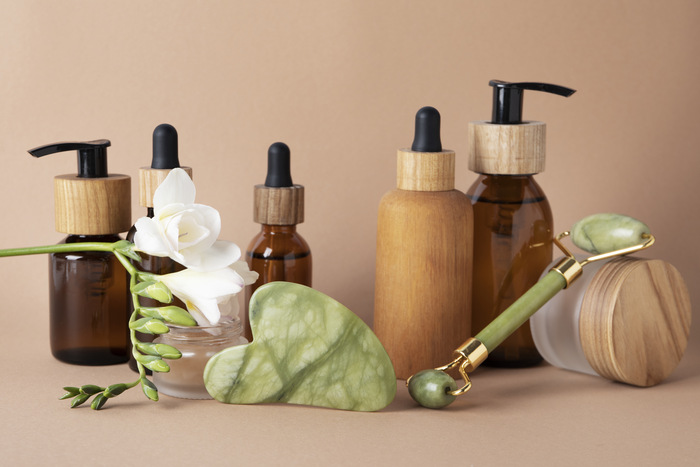
What Glowing Skin Means to You
Embarking on a journey to unlock the secrets of glowing skin isn’t just about aesthetics; it’s about embracing confidence and self-care. Radiant, healthy-looking skin isn’t merely a surface-level attribute; it reflects your overall well-being and lifestyle choices. In this comprehensive guide, we’ll delve into ten essential steps that will transform your skincare routine and help you achieve the luminous complexion you desire.
Understanding Your Skin
Identifying Your Skin Type
Before diving into any skincare regimen, it’s crucial to understand your skin type. Whether you have oily, dry, combination, or sensitive skin significantly impacts the products and routines that will work best for you. Each skin type has its unique characteristics and requires tailored care to achieve optimal results.
Recognizing Common Skin Concerns
In addition to identifying your skin type, it’s essential to recognize any specific concerns or issues you may have. Whether it’s acne, hyperpigmentation, fine lines, or dehydration, addressing these concerns directly will guide your skincare choices and treatment plans effectively.
Cleansing
Choosing the Right Cleanser
Cleansing lays the foundation for a successful skincare routine by removing dirt, oil, and impurities that accumulate throughout the day. Selecting a cleanser formulated for your skin type ensures thorough yet gentle cleansing without stripping away essential moisture.
The Importance of Double Cleansing
Double cleansing, a skincare technique originating from Korean beauty rituals, involves using an oil-based cleanser followed by a water-based cleanser to ensure a deep and thorough cleanse. This method effectively removes sunscreen, makeup, and other impurities, leaving your skin clean, refreshed, and ready for subsequent skincare steps.
Exfoliation
Physical vs. Chemical Exfoliation
Exfoliation is a vital step in any skincare routine, promoting cell turnover and revealing smoother, brighter skin underneath. There are two primary methods of exfoliation: physical and chemical. Physical exfoliants, such as scrubs or brushes, physically remove dead skin cells, while chemical exfoliants, like alpha hydroxy acids (AHAs) or beta hydroxy acids (BHAs), dissolve the bonds between skin cells, allowing for gentle yet effective exfoliation.
Frequency and Methods
Finding the right balance and frequency of exfoliation is key to achieving glowing skin without over-exfoliating, which can lead to irritation and sensitivity. Incorporating exfoliation into your routine 2-3 times a week, depending on your skin’s tolerance, helps maintain a smooth and radiant complexion.
Hydration
Importance of Hydration for Glowing Skin
Hydration is the cornerstone of healthy, glowing skin. Properly hydrated skin appears plump, radiant, and youthful, while dehydration can lead to dullness, fine lines, and uneven texture. Incorporating hydrating products into your skincare routine, such as moisturizers, serums, and hyaluronic acid, helps lock in moisture and maintain skin’s natural barrier function.
Choosing the Right Moisturizer
Finding the perfect moisturizer for your skin type and concerns is essential for achieving optimal hydration. Whether you prefer lightweight lotions, rich creams, or gel-based formulas, look for ingredients like ceramides, glycerin, and niacinamide to replenish and nourish your skin.
Sun Protection
Why Sunscreen is Non-Negotiable
Protecting your skin from the sun’s harmful UV rays is crucial for maintaining a healthy complexion and preventing premature aging. Sunscreen not only shields your skin from sunburn but also helps prevent photoaging, dark spots, and skin cancer.
Finding the Ideal Sunscreen
When selecting a sunscreen, opt for broad-spectrum formulas with SPF 30 or higher and reapply every two hours, especially when outdoors. Look for lightweight, non-comedogenic options that won’t clog pores or leave a greasy residue, making it easier to incorporate sun protection into your daily routine.
Nutrition and Diet
Impact of Diet on Skin Health
What you put into your body reflects in your skin’s health and appearance. A balanced diet rich in vitamins, minerals, antioxidants, and essential fatty acids nourishes your skin from within, promoting a clear, radiant complexion.
Foods for Healthy, Glowing Skin
Incorporate skin-loving foods into your diet, such as fruits, vegetables, whole grains, lean proteins, and healthy fats. Foods high in antioxidants, like berries and leafy greens, help combat free radical damage and inflammation, while omega-3 fatty acids found in salmon and walnuts support skin hydration and elasticity.
Lifestyle Factors
Stress Management Techniques
Chronic stress can wreak havoc on your skin, leading to increased inflammation, breakouts, and accelerated aging. Implement stress-reducing activities into your daily routine, such as mindfulness meditation, yoga, deep breathing exercises, or spending time in nature.
Importance of Quality Sleep
Getting adequate, quality sleep is essential for skin repair and regeneration. Aim for 7-9 hours of sleep each night to allow your skin cells to rejuvenate, collagen production to increase, and dark circles and puffiness to diminish.
Skincare Ingredients
Key Ingredients for Glowing Skin
Understanding skincare ingredients empowers you to make informed choices when selecting products for your routine. Look for potent ingredients like vitamin C, retinol, hyaluronic acid, niacinamide, and peptides, known for their ability to brighten, firm, hydrate, and rejuvenate the skin.
Understanding Product Labels
Navigating product labels can be overwhelming, but learning to decipher them helps you choose products that align with your skincare goals and concerns. Pay attention to the concentration of active ingredients, potential allergens, and avoid common irritants like alcohol, fragrances, and artificial dyes.
Professional Treatments
Dermatological Procedures for Enhanced Skin Radiance
In addition to at-home skincare routines, professional treatments offer advanced solutions for achieving radiant skin. Consult with a board-certified dermatologist to explore options such as chemical peels, microdermabrasion, laser therapy, or microneedling tailored to your specific needs and goals.
Safety and Considerations
Before undergoing any dermatological procedure, ensure you fully understand the risks, benefits, and potential side effects. Choose a reputable practitioner with extensive experience and credentials to minimize the risk of complications and achieve optimal results safely.
Consistency and Patience
Building and Maintaining a Skincare Routine
Consistency is key when it comes to skincare. Establishing a daily regimen and sticking to it diligently allows you to reap the benefits of your efforts over time. Remember that skincare is a marathon, not a sprint, and be patient as you work towards achieving your desired results.
Managing Expectations
While following these essential steps will undoubtedly improve the health and appearance of your skin, it’s essential to manage your expectations realistically. Results may not be immediate, and achieving glowing skin requires ongoing commitment, patience, and adjustments to your routine as needed.
FAQs
How long does it take to see results from a new skincare routine? Results from a new skincare routine can vary depending on individual factors such as skin type, concerns, and the products used. In general, noticeable improvements may be seen within a few weeks to a month, but significant changes may take several months of consistent use.
Can I use the same skincare products year-round, or should I switch them up with the seasons? While some skincare products can be used year-round, others may need to be adjusted seasonally to accommodate changes in climate, humidity levels, and skin needs. Pay attention to how your skin reacts to different environmental conditions and adjust your routine accordingly.
Is it necessary to use all ten steps outlined in this guide for glowing skin? The ten steps outlined in this guide serve as a comprehensive approach to achieving glowing skin, but not all steps may be necessary for everyone. Tailor your skincare routine to your individual needs, focusing on addressing your specific concerns and goals.
How often should I get professional skincare treatments? The frequency of professional skincare treatments depends on various factors, including your skin’s condition, treatment type, and desired outcomes. Consult with a skincare professional to determine an appropriate treatment schedule tailored to your needs.
Can I achieve glowing skin without spending a fortune on skincare products? Achieving glowing skin doesn’t necessarily require splurging on expensive products. While high-quality skincare products can yield excellent results, prioritizing consistency, sunscreen use, hydration, and a healthy lifestyle can also significantly contribute to radiant skin.
Are natural or organic skincare products better for achieving glowing skin? The efficacy of skincare products depends more on their formulation and active ingredients rather than whether they’re natural or organic. While some natural ingredients offer skincare benefits, others may be ineffective or even harmful. Focus on choosing products backed by scientific research and formulated to address your specific skin concerns.
Conclusion
Embark on your journey to glowing skin armed with these ten essential steps to transform your skincare routine. By understanding your skin, choosing the right products, and prioritizing consistency and patience, you can unlock the secrets to a radiant complexion that radiates confidence and vitality.



